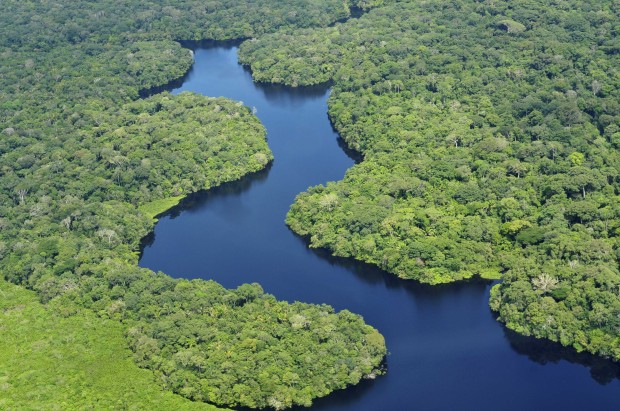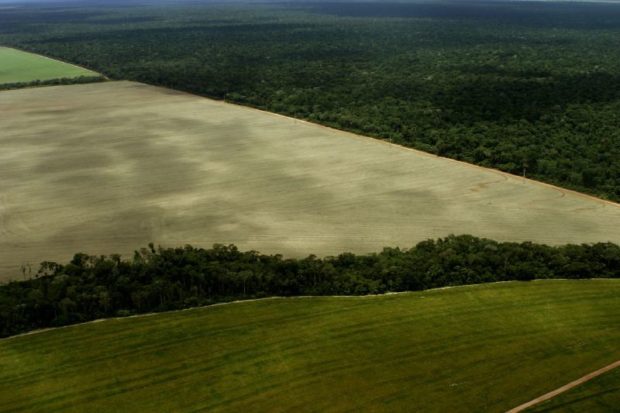We have much more to do and your continued support is needed now more than ever.
New study, co-authored by NWF, shows Amazon Soy Moratorium saves more rainforest

A new study, titled Brazil’s Soy Moratorium, published in the journal Science shows that the Soy Moratorium has dramatically reduced the amount of deforestation linked to soy production in the Brazilian Amazon, protecting valuable rainforest and the wildlife that live there.
According to the paper, whose authors include researchers from the U.S. and Brazil as well as policy experts from the National Wildlife Federation, the Amazon Soy Moratorium (a voluntary initiative in place since 2006) has been far more effective at stopping deforestation for soy than government policy alone.
Prior to the Soy Moratorium, about 30% of soy planted in the Amazon was directly replacing forests, but under the current protections, it has fallen to less than 1%,” explains lead author Holly Gibbs from the University of Wisconsin-Madison.
It is also interesting to note that, since the Moratorium was adopted, Brazilian exports of soybeans have more than doubled – a true win-win outcome for business and the environment.
This new study highlights the tremendous benefits of the Amazon Soy Moratorium, not only in terms of farmer compliance, but as a remarkably effective tool to prevent deforestation and protect critical wildlife habitat in the world’s largest tropical forest.
The Amazon is home to some of the most spectacular wildlife in the world, including elusive jungle cats such as the ocelot, powerful raptors such as the harpy eagle, and colorful reptiles such as the yellow-footed tortoise. These iconic tropical species, along with many others, rely on forested habitats for their survival; and as this study documents the Soy Moratorium has been incredibly effective at safeguarding these critical wildlife habitats against deforestation for soy in the Brazilian Amazon.
The Soy Moratorium is due to end in May next year, but NWF and the paper’s co-authors are calling for it to continue, because government policies alone will not be enough to stop all deforestation for soy.
“This study shows that the Moratorium is playing an important role in preventing deforestation for soy and therefore maintaining and strengthening it is the best strategy to protect forests and wildlife,” says Nathalie Walker, co-author and a Senior Manager at NWF.



Background
The Amazon Soy Moratorium is an agreement among major soybean traders to not purchase soy grown on land that was deforested after 2006 in the Brazilian Amazon. The Moratorium was the first voluntary zero-deforestation agreement in the tropics, and it set the stage for work on other forest-risk commodities, such as beef and leather in Brazil, and palm oil in Malaysia and Indonesia.
Towards the end of last year, the Brazilian soy industry threatened to end the Amazon Soy Moratorium. However, overwhelming objections from NGOs, academics, and responsible companies – and fear that soy-driven deforestation would shoot up yet again – helped persuade the soy industry to extend the Amazon Soy Moratorium through mid-2016.

New Research Findings
According to the findings reported in this new study, the Soy Moratorium (a voluntary initiative) has been far more effective in reducing deforestation than government policy alone. In fact, soy farmers in the Brazilian Amazon were found to be about five times more likely to violate national environmental laws (i.e. the Brazilian Forest Code) than the Soy Moratorium.
In addition, this study concluded that policies in Brazil (including the Forest Code) are not sufficient replacements and are unlikely to be fully implemented by the time the Amazon Soy Moratorium is expected to end in 2016. Instead of relying on less effective national policies, this study calls for a further extension and strengthening of the Soy Moratorium.
Deforestation monitoring should be expanded so that all soy-producing farms in the Amazon are covered. This would include soy production in rural settlement regions and farms located in indigenous territories, both of which are not currently covered by the Soy Moratorium. In addition, the Soy Moratorium (which currently only covers soy produced in the Amazon Biome) should be expanded to include other soy producing regions in Brazil, such as the Cerrado – a tropical wooded grassland region, teeming with wildlife, which has experienced large-scale soy expansion in recent years.
“What we found is that there are large areas of already cleared land suitable for soy production both in the Amazon and Cerrado, and that these areas were often cleared many years ago and would be enough to triple the current soy production,” says Praveen Noojipady, co-author and remote sensing scientist at NWF.
By directing soy production to these non-forest areas, an expansion of the Soy Moratorium would not stifle the growth of the economically important soy industry.
Overall, this new study helps reinforce the position that NWF has supported for years: maintaining and strengthening the Soy Moratorium is the best strategy for reducing soy-related deforestation.
Through our outreach to retailers, manufacturers, and agricultural traders, NWF will continue to highlight the effectiveness of the Soy Moratorium and emphasize the benefits and impacts of expanding the scope of its coverage, as well as the gaps and shortcomings of alternative options.
Continued support from companies that purchase soy (and other forest-risk commodities) will be critical to foster deforestation-free production in Brazil and elsewhere in the tropics. It’s important these companies know that we, as their customers, value deforestation-free ingredients in our personal care and food products, as our choices have a direct impact on the wildlife we all love.






















